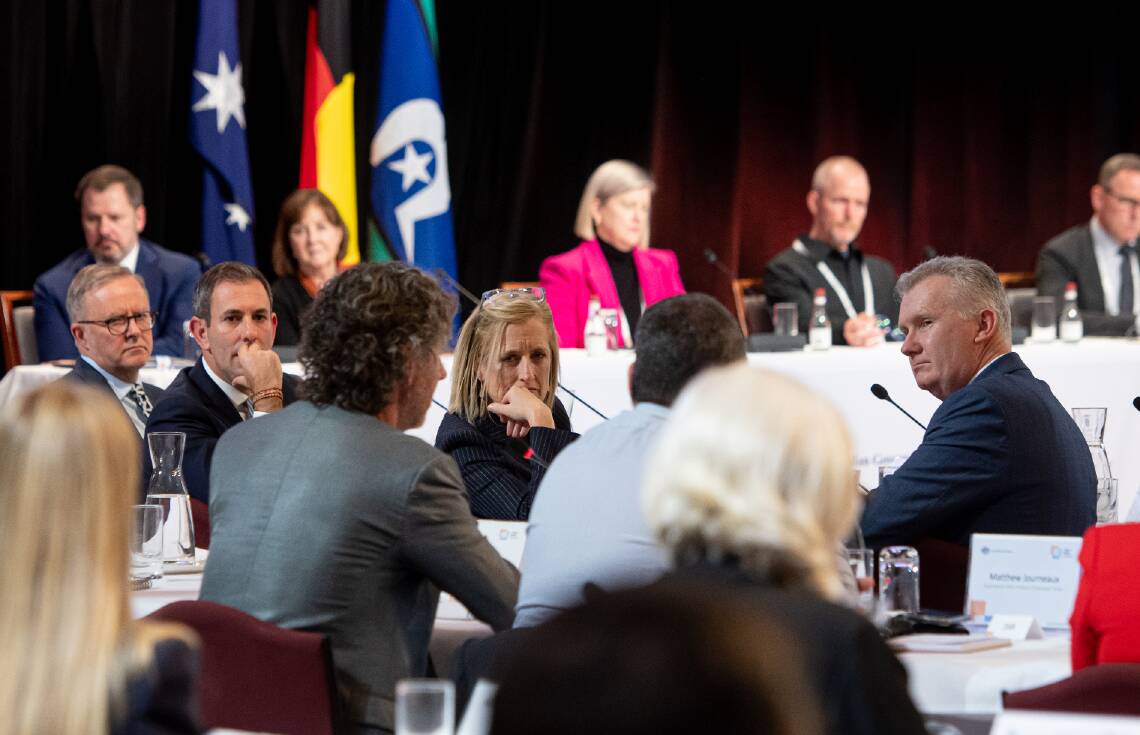
In the run up to the last election, in May 2022, Anthony Albanese, as leader of the opposition, made much of a Labor promise to hold a summit on jobs. If elected, a job summit would be followed by a government white paper on full employment, and national programs would be developed, funded and put in place. The package (the summit, the white paper, the fully-funded programs) invited voters to recall Bob Hawke's promise to bring Australians together in common purpose as he campaigned victoriously in the March 1983 election.
Bob Hawke's summit was held as a matter of urgency, within six weeks of the election, and became a standout event in Australian political history. Politicians, trade union leaders, business leaders, high-profile community representatives, locked horns. Aspirations from the labour movement's Accord document - the consequence of years of painstaking, blood-soaked development - were given concrete form by the summiteers. A vast agenda of economic reform was devised.
Australia would never be the same again. The nation's manufacturing sector became exposed to genuine international competition. Unions were forced to bargain on productivity gains rather than sweetheart deals or industrial muscle. The financial sector was opened to the rigours of market competition. The primary outcome, which we didn't understand for some time, was the generation of a reformed economy that delivered not just rising prosperity but the creation of wealth-sharing policies, like Medicare and compulsory superannuation, that upgraded Australians' access to the good life.
Four decades on, Mr Albanese's jobs summit was also given high priority by the incoming Labor government. Voters had high expectations. Frustration with the jobs market was growing. Pay packets weren't keeping pace with the rising cost of living. Once-secure jobs had become casualised. New jobs in the so-called 'gig economy' undermined basic entitlements like minimum pay rates and sick leave. The rights to unionise were being eroded.
Mr Albanese's 142 summiteers met in Canberra on September 1 and 2 last year. They comprised business and industry groups (36 per cent), unions (23 per cent), community groups (20 per cent) and government officials and academics (10 per cent). There was much grandstanding and pretence. But there was goodwill and good ideas, and Treasurer Jim Chalmers committed to their capture in the development of an employment white paper.
That white paper proved long in the making, released only last week. Called Working Future it is a challenging read, although not just because of its 264 pages. The problem is the absence of energy and commitment, the lack of vision, the failure to excite, the frustration that an agenda of change is lacking, that the present is not about to be upended and something better put in its place, that Hawke-Keating, the sequel, isn't coming to a screen near you.
Sure, Working Future lays out frankly the key labour market issue now faced by Australia: how to lever-up productivity so as to ensure an adequate number of well-paid jobs into the future. There are graphs and tables of statistics aplenty.
But absent from the white paper is the story of change in the real Australian economy. How will coal regions transform away from mining? How will the agricultural sector adjust to the vagaries and violence of climate change? How do we end the burden of young people starting their working lives saddled with $50,000 in student debt? How do we address long-term unemployment, the fact that of the 488,100 unemployed in Australia in June 2023, 102,300 (or 21 per cent) were unemployed for a year or more? And the big one: how do we give cities like Newcastle a share of the highly remunerated professional labour markets that have become entrenched in the privileged inner cores of our capital cities?
Sadly, Working Future seems destined for a short public life, an opportunity lost for a new government. Bob Hawke and his ministers knew not to waste their time in government.
Phillip O'Neill is professor of economic geography at Western Sydney University.
Pictured: Prime Minister Anthony Albanese, Treasurer Jim Chalmers, Finance Minister and Minister for Women Katy Gallagher and Employment Minister Tony Burke at the 2022 Jobs Summit. Picture by Elesa Kurtz







